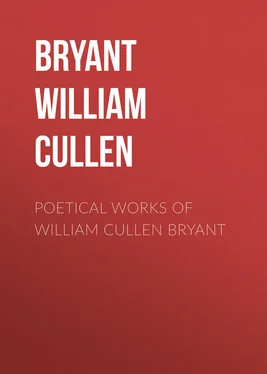William Bryant - Poetical Works of William Cullen Bryant
Здесь есть возможность читать онлайн «William Bryant - Poetical Works of William Cullen Bryant» — ознакомительный отрывок электронной книги совершенно бесплатно, а после прочтения отрывка купить полную версию. В некоторых случаях можно слушать аудио, скачать через торрент в формате fb2 и присутствует краткое содержание. ISBN: , Жанр: foreign_antique, foreign_prose, foreign_poetry, на английском языке. Описание произведения, (предисловие) а так же отзывы посетителей доступны на портале библиотеки ЛибКат.
- Название:Poetical Works of William Cullen Bryant
- Автор:
- Жанр:
- Год:неизвестен
- ISBN:http://www.gutenberg.org/ebooks/29700
- Рейтинг книги:3 / 5. Голосов: 1
-
Избранное:Добавить в избранное
- Отзывы:
-
Ваша оценка:
- 60
- 1
- 2
- 3
- 4
- 5
Poetical Works of William Cullen Bryant: краткое содержание, описание и аннотация
Предлагаем к чтению аннотацию, описание, краткое содержание или предисловие (зависит от того, что написал сам автор книги «Poetical Works of William Cullen Bryant»). Если вы не нашли необходимую информацию о книге — напишите в комментариях, мы постараемся отыскать её.
Poetical Works of William Cullen Bryant — читать онлайн ознакомительный отрывок
Ниже представлен текст книги, разбитый по страницам. Система сохранения места последней прочитанной страницы, позволяет с удобством читать онлайн бесплатно книгу «Poetical Works of William Cullen Bryant», без необходимости каждый раз заново искать на чём Вы остановились. Поставьте закладку, и сможете в любой момент перейти на страницу, на которой закончили чтение.
Интервал:
Закладка:
"The British soldier trembles
When Marion's name is told."
"That won't do at all, you know." The absurdity of the objection must have struck the humorist comically; but as he wanted the volume republished, he good-naturedly saved the proverbial valor of the British soldier by changing the first line to
"The foeman trembles in his camp,"
and the tempest in a teapot was over, as far as England was concerned. Not as far as the United States was concerned, however; for when the circumstance became known to Mr. Leggett, he excoriated Mr. Irving for his subserviency to a bloated aristocracy, and so forth. Mr. John Wilson reviewed the book in Blackwood's Magazine in a half-hearted way, patronizing the writer with his praise.
The poems that Mr. Bryant wrote during the first seven years of his residence in New York (some forty in number, not including translations) exhibited the qualities which distinguished his genius from the beginning, and were marked by characteristics which were rather acquired than inherited. In other words, they were somewhat different from those which were written at Great Barrington. The Hellenic element was still visible in "The Greek Partisan" and "The Greek Boy," and the aboriginal element in "The Disinterred Warrior." The large imagination of "The Hymn to the North Star" was radiant in "The Firmament," and in "The Past." Ardent love of nature found expressive utterance in "Lines on Revisiting the Country," "The Gladness of Nature," "A Summer Ramble," "A Scene on the Banks of the Hudson," and "The Evening Wind." The little book of immortal dirges had a fresh leaf added to it in "The Death of the Flowers," which was at once a pastoral of autumn and a monody over a beloved sister. A new element appeared in "The Summer Wind," and was always present afterward in Mr. Bryant's meditative poetry – the association of humanity with nature – a calm but sympathetic recognition of the ways of man and his presence on the earth. The power of suggestion and of rapid generalization, which was the key-note of "The Ages," lived anew in every line of "The Prairies," in which a series of poems present themselves to the imagination as a series of pictures in a gallery – pictures in which breadth and vigor of treatment and exquisite delicacy of detail are everywhere harmoniously blended, and the unity of pure Art is attained. It was worth going to the ends of the world to be able to write "The Prairies."
Confiding in the discretion of his associate Mr. Leggett, and anxious to escape from his daily editorial labors, Mr. Bryant sailed for Europe with his family in the summer of 1834. It was his intention to perfect his literary studies while abroad, and to devote himself to the education of his children; but his intention was frustrated, after a short course of travel in France, Germany, and Italy, by the illness of Mr. Leggett, whose mistaken zeal in the advocacy of unpopular measures had seriously injured the Evening Post . He returned in haste early in 1836, and devoted his time and energies to restoring the prosperity of his paper. Nine years passed before he ventured to return to Europe, though he managed to visit certain portions of his own country. His readers tracked his journeys through the letters which he wrote to the Evening Post , and which were noticeable for justness of observation and clearness of expression. A selection from Mr. Bryant's foreign and home letters was published in 1852, under the title of "Letters of a Traveler."
The life of a man of letters is seldom eventful. There are, of course, exceptions to the rule; for literature, like other polite professions, is never without its disorderly followers. It is instructive to trace their careers, which are usually short ones; but the contemplation of the calm, well-regulated, self-respecting lives of the elder and wiser masters is much more satisfactory. We pity the Maginns, and Mangans, and Poes, whom we have always with us; but we admire and reverence such writers as Wordsworth, and Thackeray, and Bryant, who dignify their high calling. The last thirty years of the life of Mr. Bryant were devoid of incidents, though one of them (1866) was not without the supreme sorrow – death. He devoted himself to journalism as conscientiously as if he still had his spurs to win, discussing all public questions with independence and fearlessness; and from time to time, as the spirit moved him, he added to our treasures of song, contributing to the popular magazines of the period, and occasionally issuing these contributions in separate volumes. He published "The Fountain and Other Poems" in 1842; "The White-Footed Deer and Other Poems" in 1844; a collected edition of his poems, with illustrations by Leutze, in 1846; an edition in two volumes in 1855; "Thirty Poems" in 1866; and in 1876 a complete illustrated edition of his poetical writings. To the honors which these volumes brought him he added fresh laurels in 1870 and 1871 by the publication of his translation of the "Iliad" and the "Odyssey" – a translation which was highly praised both at home and abroad, and which, if not the best that the English language is capable of, is, in many respects, the best which any English-writing poet has yet produced.
There comes a day in the intellectual lives of most poets when their powers cease to be progressive and productive, or are productive only in the forms to which they have accustomed themselves, and which have become mannerisms. It was not so with Mr. Bryant. He enjoyed the dangerous distinction of proving himself a great poet at an early age; he preserved this distinction to the last, for the sixty-four years which elapsed between the writing of "Thanatopsis" and the writing of "The Flood of Years" witnessed no decay of his poetic capacities, but rather the growth and development of trains of thought and forms of verse of which there was no evidence in his early writings. His sympathies were enlarged as the years went on, and the crystal clearness of his mind was colored with human emotions.
To Bryant, beyond all other modern poets, the earth was a theatre upon which the great drama of life was everlastingly played. The remembrance of this fact is his inspiration in "The Fountain," "An Evening Revery," "The Antiquity of Freedom," "The Crowded Street," "The Planting of the Apple-Tree," "The Night Journey of a River," "The Sower," and "The Flood of Years." The most poetical of Mr. Bryant's poems are, perhaps, "The Land of Dreams," "The Burial of Love," "The May Sun sheds an Amber Light," and "The Voice of Autumn;" and they were written in a succession of happy hours, and in the order named. Next to these pieces, as examples of pure poetry, should be placed "Sella" and "The Little People of the Snow," which are exquisite fairy fantasies. The qualities by which Mr. Bryant's poetry are chiefly distinguished are serenity and gravity of thought; an intense though repressed recognition of the mortality of mankind; an ardent love for human freedom; and unrivaled skill in painting the scenery of his native land. He had no superior in this walk of poetic art – it might almost be said no equal, for his descriptions of nature are never inaccurate or redundant. "The Excursion" is a tiresome poem, which contains several exquisite episodes. Mr. Bryant knew how to write exquisite episodes, and to omit the platitudes through which we reach them in other poets.
It is not given to many poets to possess as many residences as Mr. Bryant, for he had three – a town-house in New York, a country-house, called "Cedarmere," at Roslyn, Long Island, and the old homestead of the Bryant family at Cummington. He passed the winter months in New York, and the summer and early autumn months at his country-houses. No distinguished man in America was better known by sight than he.
Читать дальшеИнтервал:
Закладка:
Похожие книги на «Poetical Works of William Cullen Bryant»
Представляем Вашему вниманию похожие книги на «Poetical Works of William Cullen Bryant» списком для выбора. Мы отобрали схожую по названию и смыслу литературу в надежде предоставить читателям больше вариантов отыскать новые, интересные, ещё непрочитанные произведения.
Обсуждение, отзывы о книге «Poetical Works of William Cullen Bryant» и просто собственные мнения читателей. Оставьте ваши комментарии, напишите, что Вы думаете о произведении, его смысле или главных героях. Укажите что конкретно понравилось, а что нет, и почему Вы так считаете.












